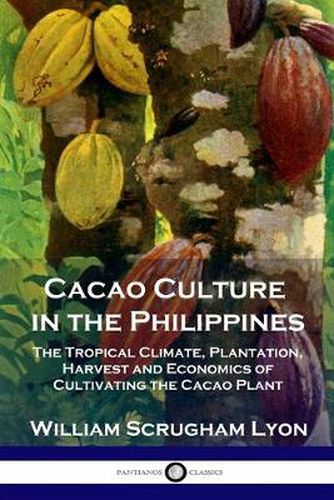Readings Newsletter
Become a Readings Member to make your shopping experience even easier.
Sign in or sign up for free!
You’re not far away from qualifying for FREE standard shipping within Australia
You’ve qualified for FREE standard shipping within Australia
The cart is loading…






This title is printed to order. This book may have been self-published. If so, we cannot guarantee the quality of the content. In the main most books will have gone through the editing process however some may not. We therefore suggest that you be aware of this before ordering this book. If in doubt check either the author or publisher’s details as we are unable to accept any returns unless they are faulty. Please contact us if you have any questions.
This work chronicles how the cacao plant is grown commercially in the Philippines; how to properly grow, harvest and sell the cacao plant is detailed.
An authoritative overview of the cacao growing process, William Scrugham Lyon’s chronicle was popularly consulted by planters and cultivators for many years after publication in the early 20th century. He offers a concise overview of the entire process; from choosing the seeds to plant, to germination, to growing and tending the crop, harvesting and finally selling the produce.
Inclusive of charts which document the business model adopted by cacao cultivators, Lyon shows how even a small plot of land can be purposed for a steady, profitable business. At the time he published this account in Manila in 1902, demand for cacao was rocketing - as a result, many entrepreneurial farmers and growers were looking at moving into the market for cacao.
The author lived and traveled in the Philippines for many years, observing the country’s agricultural economy. At the time, farming and crops were the country’s leading source of income, with industrialization minimal. The Filipino Bureau of Agriculture - with whom the author published this account of cacao - thus counted among the most important departments of the government.
$9.00 standard shipping within Australia
FREE standard shipping within Australia for orders over $100.00
Express & International shipping calculated at checkout
This title is printed to order. This book may have been self-published. If so, we cannot guarantee the quality of the content. In the main most books will have gone through the editing process however some may not. We therefore suggest that you be aware of this before ordering this book. If in doubt check either the author or publisher’s details as we are unable to accept any returns unless they are faulty. Please contact us if you have any questions.
This work chronicles how the cacao plant is grown commercially in the Philippines; how to properly grow, harvest and sell the cacao plant is detailed.
An authoritative overview of the cacao growing process, William Scrugham Lyon’s chronicle was popularly consulted by planters and cultivators for many years after publication in the early 20th century. He offers a concise overview of the entire process; from choosing the seeds to plant, to germination, to growing and tending the crop, harvesting and finally selling the produce.
Inclusive of charts which document the business model adopted by cacao cultivators, Lyon shows how even a small plot of land can be purposed for a steady, profitable business. At the time he published this account in Manila in 1902, demand for cacao was rocketing - as a result, many entrepreneurial farmers and growers were looking at moving into the market for cacao.
The author lived and traveled in the Philippines for many years, observing the country’s agricultural economy. At the time, farming and crops were the country’s leading source of income, with industrialization minimal. The Filipino Bureau of Agriculture - with whom the author published this account of cacao - thus counted among the most important departments of the government.